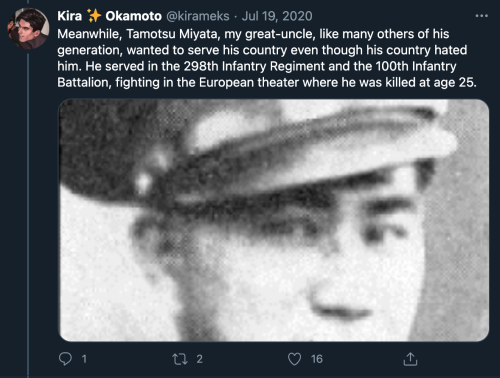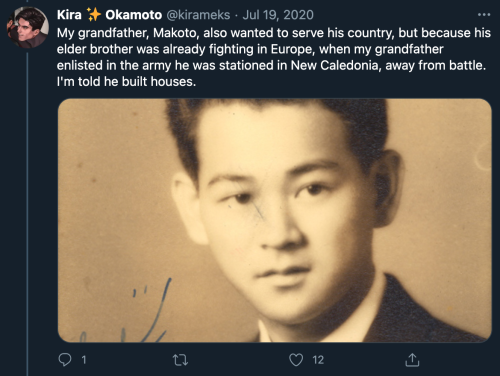https://twitter.com/kirameks/status/1284947552987570176“I take that back, I’ll talk about it t
https://twitter.com/kirameks/status/1284947552987570176“I take that back, I’ll talk about it today, because this is abhorrent. While my family on my father’s side were forced into internment camps in Utah, my family on my mother’s side fought and died in World War II to prove they were American.My pat. grandmother was a high schooler in San Francisco when Pearl Harbor happened. She was forced into deplorable conditions at Topaz Internment Camp in Utah. She faired all right, but witnessed an elderly man, hard of hearing, shot down by an MP for failing to hear an warning. When I spoke to her about it years after the fact, my grandmother said she no longer remembered the ID number she had been forced to go by at Topaz. She was proud of this.Meanwhile, Tamotsu Miyata, my great-uncle, like many others of his generation, wanted to serve his country even though his country hated him. He served in the 298th Infantry Regiment and the 100th Infantry Battalion, fighting in the European theater where he was killed at age 25. My grandfather, Makoto, also wanted to serve his country, but because his elder brother was already fighting in Europe, when my grandfather enlisted in the army he was stationed in New Caledonia, away from battle. I’m told he built houses.After the war ended, my grandfather returned home and married my grandmother in 1946. But his experiences as a teenager in Hawaiʻi at the time of Pearl Harbor, and his time serving in the army as ‘the enemy’ irrevocably changed his attitude towards his own ethnicity & culture. My grandfather refused to teach my mother and uncle how to use chopsticks, because they needed to use forks 'like good Americans.’ He also went by 'Mac’, not 'Makoto’ upon returning home from the war. Other things, though, grandpa still loved.Growing up yonsei, I am very indicative of my generation: my 'Japaneseness’ as a concept is tied to symbols, like obon and Girl’s Day. I speak the language, but only because I learned it in college. Living in Japan as 4th generation nikkei, I felt STRONGLY the disconnect.. between actual Japanese nationals and myself as Japanese diaspora. Nikkei will never be Japanese enough for Japan, but like all minorities in America, never really American enough for America. Internment and martial law in Hawaiʻi made that clear. #NeverAgain” -- source link
Tumblr Blog : wearejapanese.tumblr.com
#japanese american#japanese#identity#nikkei#日系人#日系アメリカ人#twitter#kira okamoto#japanese internment#racism#japanese incarceration





